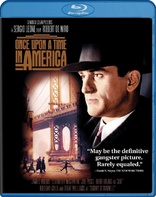Once Upon a Time in America Blu-ray Movie
HomeOnce Upon a Time in America Blu-ray Movie 
Warner Bros. | 1984 | 229 min | Rated R | Jan 11, 2011Movie rating
8.4 | / 10 |
Blu-ray rating
| Users | 3.9 | |
| Reviewer | 4.5 | |
| Overall | 3.9 |
Overview
Once Upon a Time in America (1984)
Drama about the rise and fall of a group of Jewish gangsters in New York at the beginning of the century through the 1960s.
Starring: Robert De Niro, James Woods, Elizabeth McGovern, Joe Pesci, Burt YoungDirector: Sergio Leone
| Drama | 100% |
| Crime | 47% |
| Period | 41% |
| Epic | 24% |
Specifications
Video
Video codec: MPEG-4 AVC
Video resolution: 1080p
Aspect ratio: 1.78:1
Original aspect ratio: 1.85:1
Audio
English: DTS-HD Master Audio 5.1 (48kHz, 24-bit)
French: Dolby Digital 5.1 (640 kbps)
Spanish: Dolby Digital 5.1 (640 kbps)
Japanese: Dolby Digital 5.1 (640 kbps)
Italian: Dolby Digital 5.1 (640 kbps)
German: Dolby Digital 5.1 (640 kbps)
Polish: Dolby Digital 5.1 (640 kbps)
Czech: Dolby Digital 5.1
Hungarian: Dolby Digital 5.1 (640 kbps)
Subtitles
English SDH, French, German SDH, Italian SDH, Japanese, Portuguese, Spanish, Bulgarian, Croatian, Czech, Danish, Dutch, Finnish, Greek, Hebrew, Hungarian, Korean, Mandarin (Traditional), Norwegian, Polish, Romanian, Swedish, Thai, Turkish
Discs
50GB Blu-ray Disc
Single disc (1 BD)
Playback
Region free
Review
Rating summary
| Movie | 4.5 | |
| Video | 4.0 | |
| Audio | 4.0 | |
| Extras | 2.0 | |
| Overall | 4.5 |
Once Upon a Time in America Blu-ray Movie Review
It might be twice upon a time before this film starts to make sense for some viewers.
Reviewed by Jeffrey Kauffman January 13, 2011What’s sauce for the gangster goose isn’t always sauce for the gangster gander. There are a number of interesting parallels between Francis Ford Coppola’s Godfather films and Sergio Leone’s epic Once Upon a Time in America, not the least of which is the participation of Robert De Niro. But perhaps more interestingly, in the case of The Godfather II especially and Once Upon a Time in America, both films were “revisited” and reedited to make their stories chronological. In the case of Coppola's film(s), the director himself went back to the drawing board with editor Barry Malkin to make The Godfather Saga for network television, an attempt which completely changed the back and forth timelines of the second film, something that may have made the story more easily accessible, but which completely destroyed the cross referencing and intentional irony the original film version contained. In the case of Once Upon a Time in America, that film was wrested from director Leone’s hands, even after a triumphant premiere at Cannes, and chopped to bits for its American theatrical release, once again, like The Godfather Saga, put in “correct order” and, perhaps unlike The Godfather Saga, dealt a stultifying blow to its creators’ intentions. Somehow saner heads prevailed, and after a brief run in this extremely truncated version, something approaching Leone’s original vision was re-released and the film, while never attaining true blockbuster status, has achieved a certain cult audience through the years.
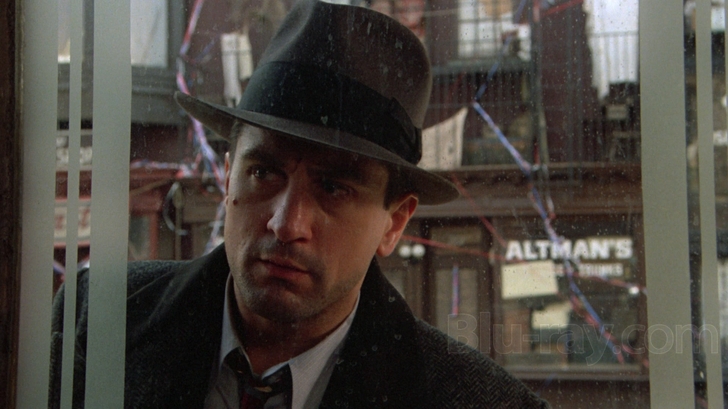
Coppola’s epic trilogy is often termed operatic, and while that certainly can’t be denied, the description is just as if not more apt for Leone’s own look at an immigrant criminal element becoming assimilated in the United States. The difference here is largely one of pace. Both films feature grandiose emotions and plot points, hyperbolic interactions and bursts of extreme violence. What sets Leone’s Once Upon a Time in America so far apart from some of its gangster film kin is its deliberate, some might argue lugubrious, tempo, which no doubt contributed to the hack job it suffered in its early release. For anyone who has seen the recent semi-homage to Leone, Anton Corbijn’s The American, you know how vigorously that film works against its genre stereotypes to almost willfully defy categorization, as indeed Leone’s own “Spaghetti westerns” did a generation previously. Perhaps to a slightly lesser extent, Leone’s American opus wants to reach beyond the confines of the traditional gangster epic to make larger points about loyalty, friendship and shifting motivations, while at the same time utilizing a lot of the time honored clichés of the gangster idiom. Does it always succeed? No. Is it an often riveting experience nonetheless? Undoubtedly.
Robert De Niro portrays David “Noodles” Aaronson, a Jewish kid from, yes, you guessed it, the wrong side of the tracks who is incarcerated at an early age, and then released in the early 1930’s just as bootlegging and Prohibition are in full swing. Noodles’ main gangster buddy is Max (James Woods), along with his some of his childhood compadres. The film utilizes the same ping-ponging time traveling technique that made Coppola’s original cut of The Godfather II so evocative. Here, we bounce back and forth between Noodles’ 1930’s escapades and a late 1960’s timeframe which sees the gangster caught up in a labyrinth of assumed identities and a long, yes, you guessed it, operatic series of events which ties together several strands of the friendship story between Noodles and Max from the 1930’s time period. Also in the mix is an earlier period from Noodles’ childhood. All three ages play off of each other and inform each other in often unexpected ways throughout the film.
But Once Upon a Time in America is not a film where a sequential précis does the project any justice. Like any good magician, Leone is such a master of misdirection (no pun intended) that large swaths of Once Upon a Time in America play out like a fevered dream, and in fact critic Richard Schickel is on record, including on his commentary track, that he feels great portions of the film are meant to be an opium induced hallucination. What is so striking about Once Upon a Time in America is how little the audience is let in on what is actually happening through whole segments and sequences. What is up with the phone that won’t stop ringing, a relentless bothersome intrusion through several timeframes in the film’s opening gambit? What does Noodles see in the briefcase he finds spirited away in the early 1930’s? What do the three bodies lying in a street, evidently part of some sort of gang hit and resultant car crash, have to do with the various plot points that are oh, so slowly being revealed through the film’s almost four hour running length? This is a film that absolutely requires patience on the part of the viewer, and if audiences weren’t exactly prepared for something this labyrinthine back in 1984 when it was originally released, one can only wonder what the reaction will be from today’s ADHD set. This is a film which virtually requires repeat viewings to completely comprehend its intricate structure and self-referencing.
But for those who stick with this film, and indeed grant it a second viewing shortly after a first, Once Upon a Time in America is like one of those old stacking Chinese doll sets, where each uncovering leads to another secret, which itself is dismembered to reveal yet another layer. This onion-peeling technique is a radical invention of Leone’s, and it’s all the more impressive in that he utilizes it while playing three disparate time periods off of each other. Even the time periods themselves are plastic, inchoate devices; Noodles will start a movement in one time period and finish it in another. The audience is left to sort things out moment by moment. The film almost plays like one of the old Warner gangster epics, the kind where two childhood friends grow up with different "career" trajectories, filtered through an almost surreal lens of memory and nostalgia, coupled with the resignation and cynicism brought on by encroaching age.
Anyone wanting a doctoral level thesis in the art of filmmaking, mise en scène and an Eisensteinian stratum example of montage theory will have a field day with Once Upon a Time in America. Dense, often opaque, and about as discursive as any supposedly narrative driven film of the past 50 years has ever been, patience is required to fully fathom what Leone is getting at with this piece. Don’t be frightened by these comments, as Once Upon a Time in America is a surprisingly brisk experience, especially considering it weighs in at almost four hours. De Niro, Woods and the entire supporting ensemble (including such stalwarts as Burt Young, Tuesday Weld, Elizabeth McGovern, a very young Jennifer Connelly and Treat Williams) are so impeccably cast that even (at least on first viewing) when confusion momentarily reigns in the mind of the viewer, there’s such compelling action most of the time that it’s easy to move ahead and go with the flow of the film’s overall momentum.
A lot (and I mean a lot) has been written and otherwise postulated about Leone’s choice for the film’s closing moments. Is it indeed an indication that much of what we’ve seen is an opium induced vision? Is it, as Schickel avers, a “pre-cognitive” event in Noodles’ own mind? Or is it simply the final, fleeting elegy of a soul attempting to find one moment of remembered peace in an otherwise tumultuous life, albeit a moment made peaceful by the numbing effects of a drug? There are no easy answers to this question, and it’s obvious that Leone meant for the viewer to wrestle with that difficult ambiguity. In fact this is an unusually challenging piece in an idiom that often prides itself on the passivity of the viewer. Once Upon a Time in America requires actual thought and an unusual amount of attention to be paid, but if it’s approached with the respect it deserves, this is one of the most involving and nuanced films of Leone’s storied career.
Once Upon a Time in America Blu-ray Movie, Video Quality 
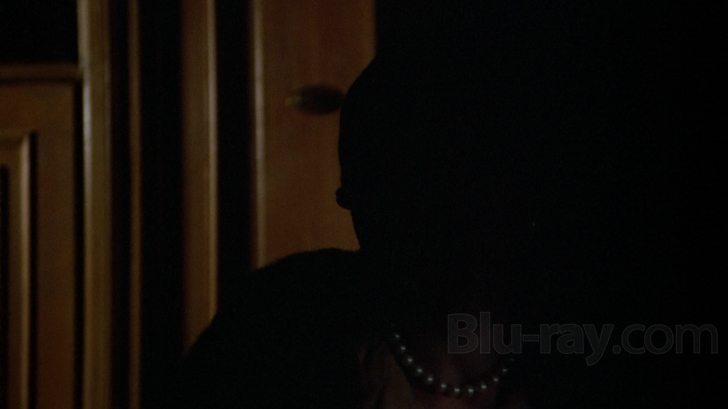
There already seems to be some (unfounded) controversy brewing over Once Upon a Time in America's AVC encoded 1080p image, in 1.78:1. I am probably one of the few people who saw the film theatrically (several times) in both its truncated and uncut versions, and it is my considered opinion that the film has never looked this good before. Overall there is a clarity and sharpness to this presentation which reveals whole new levels of fine detail. There is also a noticeable uptick in contrast and especially black values, at least in some scenes. Compare the opening moments of this Blu-ray with any previous home video version and the differences are striking. Not only are colors more beautifully saturated, black levels in the shadowy apartment reveal the glint of pearls around Noodles' moll's neck and other details which simply weren't readily visible in earlier incarnations. There are some niggling complaints which I'm sure some people will obsess over, but they are all endemic to the source material. Seemingly inexplicably, some shots are fuzzy and soft (almost always medium range shots, which argues toward the culprit being a lens), as in the medium shot of Noodles standing on a rural road as two bicyclists pedal by. Also some of the darker scenes are indeed murky, with some milky blacks, but again I'm firmly convinced these are inherent to the source material and not a result of any tinkering in the Blu-ray transfer. Some people have expressed concern over the film's length and the fact that it's "stuffed" onto one BD-50. Streaming rates hovered around 15-16 Mbps, certainly not incredibly robust, but also nothing to be very alarmed about. There really aren't many compression artifacts here of any real import.
Once Upon a Time in America Blu-ray Movie, Audio Quality 
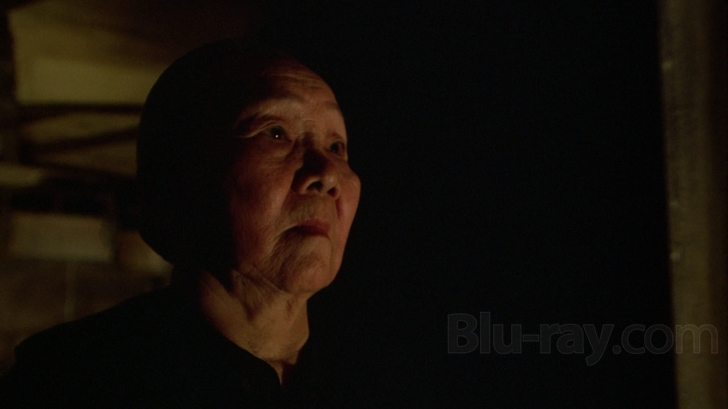
Once Upon a Time in America is provided with a lossless DTS-HD Master Audio 5.1 mix that some viewers may find less than involving, but it accurately recreates the theatrical experience without "faking" a surround scenario that the film never had to begin with. Immersion here is a fleeting circumstance, and even sound effects like the rat-a-tat-tat of machine guns will often erupt solely from the front channels. The best thing about this track is the excellent fidelity, which supports one of the most glorious scores in 20th century film, yet another masterpiece by Leone's frequent collaborator Ennio Morricone. Use of source cues (including the intentionally ironic "God Bless America," sung by Kate Smith, as well as the old standard "Yesterdays") is also very well mixed into the soundfield. There's very good to excellent dynamic range here, and no dropouts or other damage to report. Perhaps not as bombastic as some listeners might expect, but still a decent and involving soundtrack that sports excellent fidelity across all frequencies.
Once Upon a Time in America Blu-ray Movie, Special Features and Extras 
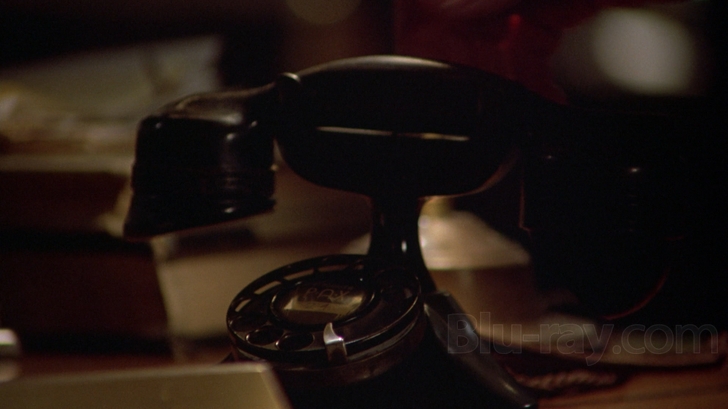
We wuz robbed, robbed I tells ya! Though this new Blu-ray ports over the (miniscule) supplements of the previous 2 DVD Collector's Edition release, a film of this stature really deserves more loving treatment.
- Feature Commentary by Richard Schickel. The longtime Time reviewer does very well on this track, though he has the penchant to hem and haw quite a bit, leading to a plethora of "um"'s and "er"'s. The information he does impart is quite well reasoned, however.
- Once Upon a Time: Sergio Leone (SD; 19:34) is an excerpt from a television documentary which provides some interesting details about the production of the film.
- Theatrical Trailer
Once Upon a Time in America Blu-ray Movie, Overall Score and Recommendation 
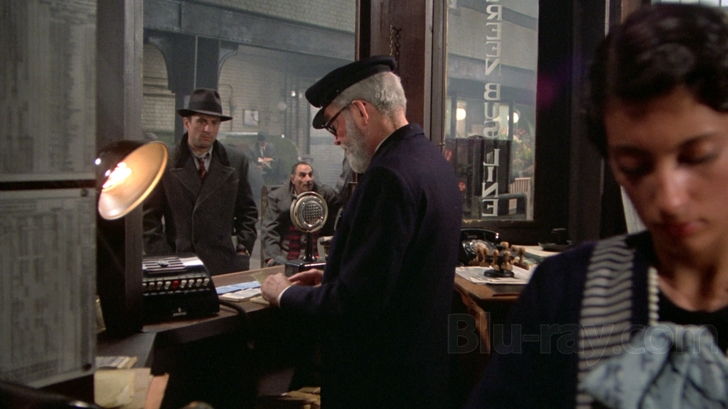
Sergio Leone's films constantly defy expectation and the tropes their supposed genres dictate. Once Upon a Time in America is one of the director's grandest achievements, a novelistic and operatic approach to the gangster idiom that demands that the audience stay on their collective toes to follow a story that reveals its secrets in dribs and drabs over the course of almost four hours. De Niro and Woods make a towering pair in this feature, but the real star here is Leone, a director at the absolute height of his inestimable powers. This Blu-ray offers the film looking better than it ever has in a home video presentation, and though there are some niggling issues to contend with in both image and audio quality, they can't negate the incredible achievement Once Upon a Time in America is in and of itself. Very highly recommended.
Other editions
Once Upon a Time in America: Other Editions

Once Upon a Time in America
Extended Director's Cut
1984

Once Upon a Time in America
Extended Director's Cut
1984
Similar titles
Similar titles you might also like

The Godfather: Part II 4K
1974

The Godfather 4K
1972

Live by Night
2016

GoodFellas 4K
1990

The Irishman
2019

Boardwalk Empire: The Complete Series
2010-2014

Casino 4K
1995

Little Caesar
1931

There Will Be Blood
2007

The Godfather: Part III
1990

City of God
Cidade de Deus
2002

The Public Enemy
1931

Billy Bathgate
1991

Carlito's Way 4K
1993

Road to Perdition
2002

Donnie Brasco
Theatrical Edition
1997

Citizen Kane 4K
2nd Corrected BD Pressing UPC Sticker 715515270113
1941

A Most Violent Year
2014

King of New York
1990

Miller's Crossing
1990
